BoJack Horseman might come across as a lighthearted animated show about a washed-up actor, who is reminiscing his days of glory. However, the show is much deeper than that and is now considered one of the most influential animated series of all time. Created by Raphael Bob-Waksberg, the show is actually a tragicomedy and features the voices of Will Arnett, Aaron Paul, and others.
The show is noted for its mature themes and nuanced exploration of subject matter like depression, trauma, racism, and more. A shows about self-reflection and growth, here are 10 BoJack Horseman episodes that prove it is the saddest yet smartest show.
Escape from LA, That went Well, and other episodes from BoJack Horseman that leave an impact
1. Ruthie

This episode of BoJack Horseman comes from the show’s fourth season and the ninth episode. The episode offers a lot of tear-jerker moments as it follows a side-story of Princess Carolyn. However, there is an inventive setup of a story, and it ends on an emotionally compelling note.
The episode focuses on a cat girl named Ruthie who is giving a presentation about her ancestor, Princess Carolyn. Ruthie mentions in her presentation how Carolyn has to face all sorts of rejections and painful losses as her relationships and friendships crumble around her.
The setup is unique and offers a depressing picture of the trials and tribulations that Carolyn has to go through. She is one of the most likable characters on the show, who always keeps her head high, and this is one of those episodes on BoJack Horseman, where the focus is on her and not on the antics of the titular character. The episode dives into Carolyn’s mentality and strength, and the emotional ending is a must-watch.
2. Downer Ending

BoJack Horseman might have moments of clever comedy, but it is a tragic and bleak series at the end of the day. This is the eleventh episode from the show’s first season, and it showcases how low BoJack’s self-worth is in his own eyes.
When Diane writes a book about him, he is unsatisfied with the way she has presented him. Therefore, he decides to rewrite his story. However, he does not do anything productive or positive and ends up consuming drugs with Todd and Sarah Lynn instead.
There is a poignant moment in the episode when BoJack begs in front of Diane and asks her if he is a good man deep down. However, Diane doesn’t answer, and the show encapsulates how BoJack still has a long way to go in his journey of self-improvement. In the episode, BoJack finally agrees that Diane’s version was better, but he couldn’t accept the way she viewed him. Philosophical and deep, the episode highlights the broken character of BoJack Horseman.
3. The Old Sugarman Place

One of those episodes in BoJack Horseman that goes deep into the past and reveals why BoJack Horseman is the way he is. The episode is the second one from the show’s fourth season and has themes of generational trauma. The episode focuses on a dejected BoJack going off the grid and returning to his family’s old lakehouse after the death of Sarah-Lynn. As he stays in the house, there are montages of his mother, Beatrice Horseman, who spent her summers there as a child with her parents.
The flashback technique is used to its full advantage, and it’s an emotionally devastating episode that deals with grief and trauma. It gives an insight into BoJack’s nature and how trauma passes from one generation to the next. The episode underscores why BoJack Horseman is a depressing yet smart show and needs to be watched once.
4. Escape from LA
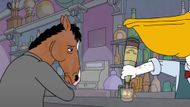
The eleventh episode from the show’s second season is especially devastating and just proves that there are times when there is no redemption in sight for BoJack Horseman. While the show is at its narrative best, the titular character makes a massive blunder.
BoJack reconnects with his friend and long-lost crush from the 1990s, Charlotte, who is now married and a mother. He stays with her family and begins to get close to Charlotte’s daughter, Penny, who is a teenager. BoJack, however, takes things to another level when he joins Penny and her friends on their prom night and makes a lifetime mistake that haunts him throughout the show.
While it is not the first time that the viewers are made aware of the horrible decisions that BoJack makes in his life, it is an episode that truly leaves an impact for the first time. The episode proves that BoJack Horseman is one of the most complex and defeated characters on screen, and the show is essentially about how many people lose sight of their purpose in life.
5. Nice while it lasted
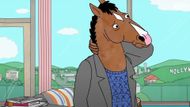
This is the sixteenth episode of season 6. It is the final episode of the show and ends on a poignant and compelling note. The show focuses on BoJack Horseman being allowed one night of freedom as he gets to attend Princess Carolyn’s wedding, and the viewers get to witness how far each character has grown since the first season.
BoJack has also come a long way since his initial hedonistic days, and instead of focusing on fame and fortune, he reconnects with the most important people in his life. From accepting the friendship of Mr. Peanutbutter to having a heartfelt moment with Princess Carolyn, who is still dependent on him, but stays strong.
BoJack also interacts with Todd, who is trying to get sober, and he finally has the most powerful interaction with Diane, who gives him a powerful piece of advice. The episode is heartfelt and is a must-watch for fans of the show.
6. The Face of Depression
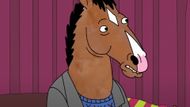
Even though BoJack Horseman deals with the titular character making some of the worst decisions, which feels like a lot at times. The show does make a point to portray mental health with a lot of sensitivity. One of the rawest and real episodes, this is the seventh one from the show’s sixth season.
The final season shows a lot of growth in the various characters, including BoJack Horseman. Princess Carolyn begins to balance her work and home life, and Diane begins to take antidepressants. Even Mr. Peanutbutter is happy with getting a collaboration with BoJack, and BoJack finally decides to be a good friend and travels to see Diane.
In this episode, BoJack is the one with sense, and he guides Diane, who is down in the dumps. The viewers finally get to see BoJack Horseman making progress and trying to be a better person. He finally supports the people around him, and the episode highlights the struggles of people with mental health issues in a heartbreaking yet relatable manner.
7. That Went Well
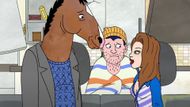
The finale episode of the show’s third season of BoJack Horseman is all about the lead character running away from things and responsibility, and this episode tackles that. The episode proves why BoJack Horseman is a sad yet smart show.
BoJack is at his lowest point as he has just witnessed Sarah Lynn’s death and has a part to play in her death. However, when an opportunity arises to get back into the show business, BoJack immediately grabs it to run away from confronting the important things in his life.
However, the episode has a powerful ending as he speeds away in his car and lets go of the wheel, until he notices a pack of wild horses running freely in the distance. The horses running freely are symbolic of freedom and make BoJack realize that he is constantly running away from tough situations. The moment is important and influences BoJack’s arc in the remainder of the show.
8. The Dog Days are Over
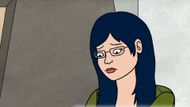
This is the second episode of the show’s fifth season. BoJack Horseman generally revolves around BoJack, but this episode is dedicated to Diane, who is one of the most complex characters on the show. In the episode, Diane goes on a trip to Vietnam to self-reflect after her stressful divorce. However, there are moments of culture shock, and Diane ultimately finds guidance from her own writing while on the trip. She wrote a stellar article that sets the structure of the episode as well.
The episode reveals how BoJack Horseman is one of the smartest shows to be written. In the episode, viewers get to see the psyche of a person who is in a moment of grief. It focuses on expectations not lining up with reality and adds depth to the overall show. BoJack Horseman is a show that is capable of telling an emotional yet hilarious tale of self-discovery.
9. Let’s Find Out

Even though Mr. Peanutbutter is dismissed by everyone as a frivolous character, BoJack Horseman is a show that reveals slowly but steadily that each character has an emotional backstory and all of them have depth. In this episode, which is the eighth one in the show's second season, viewers get to dive deep into the character of Mr. Peanutbutter.
While the episode initially comes off as hilarious, as BoJack is a guest on a game show run by Mr. Peanutbutter and is annoyed, it soon takes a painful turn. The topic of conversation turns to BoJack’s past with Diane and his relationship with Mr. Peanutbutter. The episode mixes cliches of daytime soaps with satirical humor to present a deeper examination of Mr. Peanutbutter’s character in BoJack Horseman.
Even though the character is rooted in humorous gags, this is the episode where viewers get to see inside the psyche of Mr. Peanutbutter and his ability to have emotional depth.
10. Free Churro

An episode that is one of the most poignant yet deeply reflective is episode 6 from season 5. The entire episode is a monologue by BoJack Horseman, and he talks about the struggles of mourning an abusive parent who could never support their children in the ways their children needed. Viewers finally get to see how BoJack feels about his mother’s death and the impact she had on him and continues to have throughout his life.
The episode is hilarious and tragic, underscoring how BoJack Horseman is one of the saddest yet smartest shows to grace the screen. There are various riffs from the off-camera organ player that provide comic relief while the episode features a deep discussion about the complexity of grief. The show takes a mature stand on grief as BoJack struggles with heartbreak, anger, and confusion, all at once.
